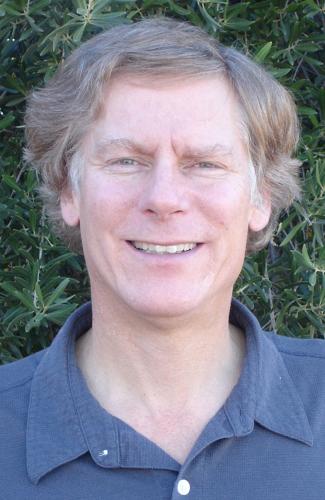Jonathan Overpeck, a globally recognized climate researcher who co-authored a Nobel Prize-winning report, is leaving his longstanding University of Arizona post for a top-level University of Michigan job.
In a move that fellow researchers describe as “devastating” and “a tremendous loss” to the UA, Overpeck will become dean of the Michigan university’s new School for Environment and Sustainability.
Overpeck will leave his UA Institute for the Environment director’s post in August.
“I believe some of you knew I was invited to apply to this position back in the fall, and after an unusually involved process and several visits, the deal became just too good to turn down,” Overpeck said in an email Friday to faculty members at the UA institute.
He has long dreamed of working with a broad, interdiscplinary group of faculty colleagues, alumni and off-campus partners “to really step up the impact that large top-quality public universities have in society with respect to conserving our environment and ensuring more sustainable approaches to the future,” Overpeck said in his email.
The University of Michigan “has decided to invest heavily to integrate world-class research, education and engagement, drawing from across their entire campus, to achieve the same dream,” he said.
Globally, Overpeck is best known as a lead author on the 2007 and the 2010-14 climate assessments published by the Intergovernmental Panel on Climate Change. The 2007 report was jointly awarded the Nobel Peace Prize along with Al Gore, former vice president and longtime climate crusader.
As head of the UA institute, Overpeck has published regularly on a host of climate issues, specializing in the Colorado River, general Southwest climate issues and sea-level rise due to melting polar ice caps, among others.
He came to UA in 1999 to run its Institute for Study of the Planet Earth, which was renamed to its current title in 2009. He has been director or co-director of the institute since then.
Overpeck also has been at the forefront of those who warned about climate change’s impact on the Colorado River. Early this year, he and Colorado State University water researcher Brad Udall published a study that for the first time scientifically linked the river’s declining flows since 2000 to hot, dry weather triggered and/or aggravated by climate change. Just this week, the two published a less scholarly account of that research on the national website the Conversation.
But while he has published about 200 research papers, Overpeck also has been heavily engaged in the heated public debate over climate change, having testified nine times before Congress and more than once at the Arizona Legislature.
Overpeck, who was traveling this week in Europe, didn’t respond to an email or a text message from the Star seeking comment on his departure from the UA. But the researcher, a frequent Twitter user, tweeted a plug Friday for his new employer, for its just-announced plan to offer free tuition to Michigan residents whose family’s income is less than $65,000 annually.
Several researchers said his depature will be a serious blow to the UA. Overpeck’s wife, Julia Cole, also a UA faculty member since that time, in geosciences, hydrology and atmospheric sciences, will be joining the University of Michigan’s faculty as well.
“It breaks my heart. It’s a tremendous loss to UA,” Tucson native Udall said Friday of Overpeck’s departure. “He brings scientific rigor to the job, and he’s a likable person. He’s just a joy to everyone he encounters. He’s everything you want in an individual who works in the academic realm.”
UA climate scientist David Breshears, using Overpeck’s common nickname, said “Peck is a force of nature.”
“He is an incredible scientist on so many levels. He tweets for the public all the time, but he’s also a super strong interdisciplinary scientist who interacts with physical scientists, ecologists, social scientists and local, national and international decision makers,” said Breshears, a professor of natural resources and global change and chair of the UA institute’s faculty advisory committee.
Overpeck’s hiring at Michigan is a testimony to his impressive scholarly work and his visionary leadership, said Diana Liverman, his co-director at the UA institute until stepping down last December. His achievements included bringing in millions of dollars in research funding — including support for major regional centers focusing on the region’s environmental and climate challenges, she said.
“His work has alerted us to the risks we face in managing water and other resources in the face of climate change and has provided important insights into past climate variability and change in the Southwest and globally,” Liverman said.
Overpeck’s departure is “a personal tragedy for me” because he’s an extraordinary scientist and a good friend, added UA science dean Joaquin Ruiz.
He has been working with Overpeck on an ongoing study of the desert environment for the National Academy of Sciences and the Mexican Academy of Sciences. The two have worked together at Biosphere II, where Ruiz is director and Overpeck sits on its governing board.
“He’s a clear thinker, a very broad thinker,” Ruiz said of Overpeck.
Overpeck’s departure comes a bit more than nine years after he decided not to leave the UA for another plum job in the Midwest. That time, he was a finalist for director of the Gaylord Nelson Institute for Environmental Studies at the University of Wisconsin in Madison.
He decided to stay after UA administrators agreed to construct a new $90 million building housing environmental researchers from several departments. The UA also agreed to hire more faculty in environmental science and to give a 22 percent salary boost to Overpeck, taking his pay at the time to $160,000 a year.
This time around, the UA offered him “a substantial retention package” to try to stop him from leaving, said UA spokesman Chris Sigurdson, who declined to release details on the grounds that it was a personnel matter.
“They’re lucky to have him,” Sigurdson said of the Michigan school. “In addition to being a great teacher and a great researcher, he’s been a mentor to many faculty here.”
In his email Friday to the UA faculty, Overpeck said his decision to leave wasn’t easy and that “it will be bittersweet to leave you all.”
“It’s been humbling, and a real pleasure, to work with you, and I hope the UA environmental enterprise is able to continue moving forward in the future. The biggest asset for the future is you — the amazing environmental faculty across campus,” he wrote.






